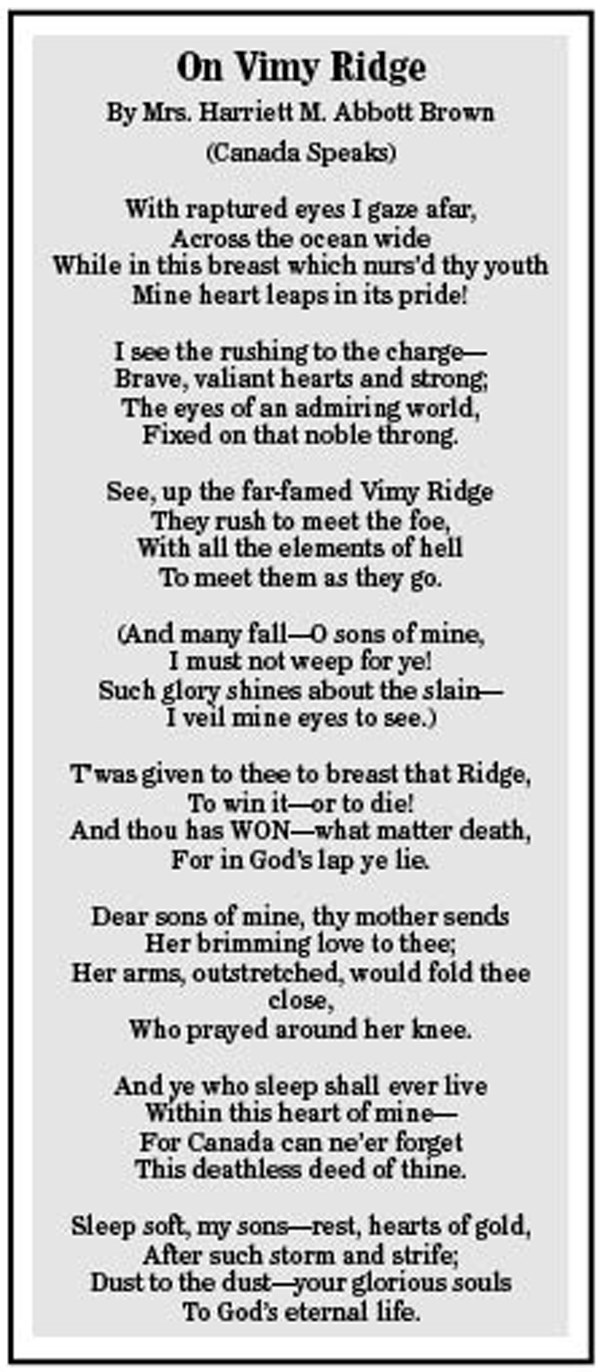Today marks the 100th anniversary of the end of what was arguably the most iconic battle in Canadian military history.
The Battle of Vimy Ridge, April 9-12, 1917, was part of the opening phase of a much grander objective, the Arras offensive. Controlling the ridge at the northernmost end of the Western Front, which fell to the Canadian Corps, would give cover to British forces attacking German lines on the southern flank near the French city of Arras.
During April and May of 1917, there was little else in The Enterprise besides war and provincial election news, but the paper did not report specifically on Vimy or Arras. This perhaps gives some credence to the view of some historians that the Canada-coming-of-age narrative attached to Vimy is a somewhat overblown, symbolic creation of latter 20th century patriotism. The Enterprise did, however, publish a poem in the April 26 edition (see sidebar this page).
And there is no disputing it was an extremely significant battle for Canada. More than 3,600 Canadians were killed and more than 7,000 were injured. Its 100th anniversary commemoration at the memorial in France this past Sunday was attended by thousands including Canadian Prime Minister Justin Trudeau and Governor General David Johnston; President Francois Hollande of France; and Princes Charles, William and Harry of Great Britain.
The first reports of Vimy in The Enterprise, however, did not come until June 7, 1917, when the newspaper published excerpts of letters from Yorkton men who had been involved in the offensive.
One such correspondence came from a Corporal Bosworth of the 31st Battalion, who wrote to someone identified as Chief Zeats in the article:
“Well, Theo, it is rather late in the day for me to say anything about the exploits of the Canadian boys, which commenced in the early hours of Easter Monday morning, because you will have read all about it in your own press. How they done what was thought at one time impossible, took Vimy Ridge from the enemy. Easter Monday was a great day for Canada, and one she may well be proud of. Even the British press, which formerly has not been very lavish with praise for the Canadians, condescended to mention their existence.
“Now, Theo, we cannot keep going into these scraps without having casualties and they must be replaced. We have the guns and ammunition but we need men, so do all in your power to speed up recruiting, because the more men we get and sooner we get them, the sooner the war would be over and the boys back home again.”
Aside from war news, the paper was mostly concerned with the provincial election, which was to be held June 26. And there was little doubt with whom The Enterprise sided.
“The efforts of the Liberal Party to secure political advantage by stirring up racial strife will meet with the sternest condemnation by all true citizens,” wrote S.N. Wynn, managing editor.
“Such tactics are at all times mischievous and despicable, but at the present time they are dangerous and treasonable.”
Despite Mr. Wynn’s editorializing, Yorkton elected Thomas Garry, a Liberal as its representative and the new Liberal leader William Martin led the party to a fourth consecutive victory with 51 of the 59 available seats.
Advertisers at the times made no bones about exploiting the war. That week in 1917, The Hudson’s Bay Company ad ran with the headline: “Patriotism demands that you spend - but spend wisely.” Deals of the day were men’s work shirts for a dollar; a 98-pound sac of flour for $7.50 with the proviso “The greatest good to the greatest number so only one lot to each customer”; and bars of bath soap for 10 cents each.



